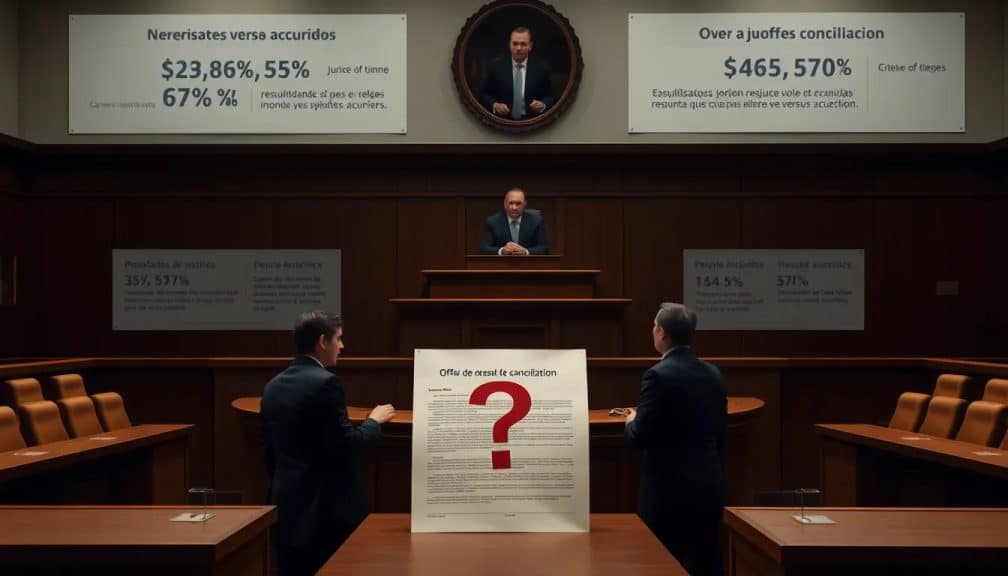Deciding whether to accept a settlement offer or go to trial can be one of the most critical decisions in a personal injury case. Understanding the implications behind the offer is essential for making an informed choice.
In this article, we will explore the circumstances under which you might reject a settlement offer, along with the potential outcomes of such a decision.
What happens if you reject a settlement offer?
Rejecting a settlement offer can have significant implications for your case. First, it signals to the opposing party that you do not agree with their terms. This can lead to further negotiations or, in some cases, litigation.
One crucial aspect to consider is that insurance companies often make initial low offers hoping that the claimant will accept them without further negotiation. By rejecting the offer, you may open the door to a more favorable settlement.
However, rejecting the offer also means that you need to be prepared for the possibility of going to trial, which can be time-consuming and costly. Additionally, you must weigh the potential benefits against the risks involved.
What factors should you consider when deciding to reject a settlement offer?
There are several key factors to consider before deciding to reject a settlement offer. One primary element is the adequacy of compensation being offered. Does it sufficiently cover your medical expenses, lost wages, and pain and suffering? If the answer is no, it may warrant rejection.
Another important consideration is the severity of the injuries sustained. More serious injuries may justify pushing for a higher settlement or going to trial to secure adequate compensation.
- Current and future medical expenses
- Emotional distress and pain and suffering
- Long-term impacts on quality of life
- Extent of liability and fault
Understanding the full scope of your damages is crucial. An experienced personal injury attorney can help assess whether the settlement offer reflects the true value of your claim.
What are the consequences of rejecting an insurance settlement offer?
Choosing to reject an insurance settlement offer can lead to various outcomes. One immediate consequence is that it may trigger further negotiations, which could result in a better offer. However, it's also possible that the insurance company may not return with any additional offers.
Another potential consequence is the transition to a more formal litigation process, which can be lengthy and costly. You should be prepared for court action and the associated legal fees.
Moreover, if you ultimately choose to go to trial and lose, you may end up with no compensation whatsoever. Therefore, ensure that you thoroughly evaluate the potential risks and rewards before making your decision.
How can a personal injury attorney assist after rejecting a settlement?
A personal injury attorney plays a vital role in guiding you through the complexities of rejecting a settlement offer. Their expertise can be invaluable in negotiating better terms, as they know how to effectively communicate your worth to the insurance companies.
If you decide to reject the offer, your attorney can help you gather additional evidence to strengthen your case. This might include obtaining medical records, expert testimonies, and other documentation to support your claim.
Additionally, your attorney can help you navigate the litigation process if it comes to that. They will represent you in court, ensuring that your rights are protected and that you have the best chance of securing fair compensation.
What is the process after declining a settlement offer?
After you decline a settlement offer, the process can vary based on the specifics of your case. Typically, the first step is to inform the insurance company of your decision formally. Following that, you may enter negotiations once again.
If negotiations do not result in a satisfactory offer, you may consider filing a lawsuit. This initiates the litigation process, which can involve discovery, depositions, and potentially a trial.
It's essential to stay in close communication with your attorney during this phase. They will guide you through each step and ensure you are prepared for the challenges ahead.
When is it wise to go to trial instead of accepting a settlement?
There are specific situations where it may be wise to go to trial rather than accept a settlement offer. One common scenario is when the settlement amount does not adequately compensate for your damages, both economic and non-economic.
Additionally, if the liability in your case is clear and you believe that a jury would favor your side, pursuing a trial may be advantageous. This is especially true when the potential award is significantly greater than what is being offered in settlement.
- The settlement offer is too low compared to your damages.
- You have strong evidence supporting your case.
- There is a belief that a jury will be sympathetic to your situation.
Ultimately, the decision to go to trial should be made after careful consultation with your attorney, who can provide insights based on their experience and knowledge of the legal landscape.
What are the common reasons for rejecting a settlement offer?
Several reasons may lead individuals to reject a settlement offer. First and foremost, many feel that the compensation offered does not adequately cover their current and future medical expenses. This is especially common in personal injury cases where long-term treatment or rehabilitation is needed.
Another common reason is the desire for justice or accountability. Some victims may wish to hold the responsible party accountable, which can often only be achieved through a trial.
- The settlement does not consider future economic damages.
- The offer comes with restrictive clauses that limit future claims.
- Insufficient compensation for pain and suffering.
Understanding these reasons can help clarify your own motivations for rejecting a settlement offer and influence your decision-making process.
Related questions about rejecting settlement offers
Questions related to deciding on settlement offers and trial options
What happens if I reject a settlement offer?
Rejecting a settlement offer typically leads to further negotiations or litigation. Your case may either go back to the negotiation table, or it may advance to court, depending on how the parties decide to move forward. It's a critical juncture that can significantly impact the outcome of your case.
Is it better to settle or go to trial?
Whether to settle or go to trial depends on various factors, including the adequacy of the settlement offer and the strength of your case. Settlements provide quicker resolution and certainty, while trials can yield higher awards but come with more risks and delays.
What happens if you decline a settlement?
Declining a settlement can activate a more formal legal process, possibly leading to litigation. It also sets the stage for further negotiations, where you may receive a more favorable offer or proceed to trial.
How to respectfully decline a settlement offer?
To decline a settlement offer, communicate your decision clearly and professionally. It’s advisable to provide reasons for your rejection, ideally supported by evidence. A personal injury attorney can help you craft a response that maintains goodwill while firmly stating your position.

